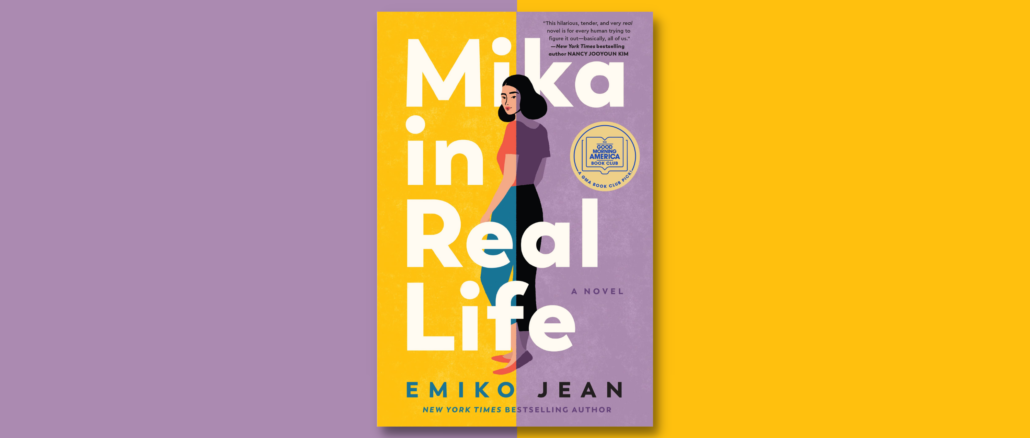
The existential bonds that transpire between a mother and child are indisputably, in the vast majority of cases, deeply embedded in the mother’s and child’s psyche forever. Veritably unbreakable (Or are they?)
Such beautiful and poignant considerations are definingly, heartbreakingly and at-times optimistically examined and detailed in stellar Japanese American author, Emiko Jean’s, latest captivating novel, “Mika in Real Life”.
Our central protagonist, Mika Suzuki, is a thirty-five year old Japanese American residing in the city of Portland (in the state of Oregon) in the United States. Mika moved to America when with her parents, Hiromi and Shige, from Japan when she was six. She is, however, most definitely not ‘living the American Dream’.
Mika, having a flimsy work history, has just been fired from her most recent job as a paralegal secretary for Kennedy, Smith and McDougal Law (a position Mika has held for under a year). Additionally grim for Mika is the fact that she shares a house with her best friend from high school, Hana (an ASL interpreter for music bands), who is a terrible housekeeper, hoarder and someone who “treated online shopping like her patriotic duty”. Mika’s most recent ex-boyfriend, Leif, sells dope.
Pivotal to Mika’s careening life trajectory is the fact that she gave up her baby, Penny, for adoption when Mika was nineteen and in college. Mika’s perpetually disapproving mother, Hiromi, (a “professional housewife”) was gravely against Mika keeping her baby, believing that Mika was incapable of looking after Penny. Additionally, Hiromi has never taken to life in the United States. “She eyed anything American with a sense of distrust”. Mika’s father, Shige, who works for a tech company, is derivative background noise in Mika’s life.
A seismic shift occurs in Mika’s tenuous and considerably fraught existence when Penny, now sixteen and living with her adoptive father, Thomas Calvin (a forty-six year old copyright lawyer) in Ohio, calls Mika one day out of the blue (Penny’s adoptive mother, Caroline, has passed away five years previously).
Mika’s overriding emotion upon hearing from Penny is unbridled joy, and the two seem to contact, and then continue contact. Mika, wanting to ‘glam up’ how her life sounds for Penny, tells a cascade of lies to Penny. The untruths include that Mika is soon opening her own art gallery, that she has an art degree, that she has a phenomenally successful boyfriend, Leif, that she has travelled a lot and that she bicycles everywhere.
When Penny informs Mika that she is planning to visit Mika (Penny winds up visiting along with Thomas), Mika ostensibly panics and catastrophises. Mika is terrified that Penny will see what Mika’s life is really like in the harsh light of day, and be disillusioned and disappointed in the life that her birth mother lives.
Mika’s friends (Hana, Charlie, Tuan, Seth and Hayato) come to the rescue, helping manufacture Mika’s life to correspond to the unrealities she has told to Penny about her life. Mika’s friends ‘do over’ her house and Leif agrees to pretend to be Mika’s boyfriend again and pose as being in ‘agriculture’. Leif also finds an art space for Mika to set up a ‘gallery’.
When Penny and Thomas (apparently stern and inflexible) visit, things go well until Hiromi (Mika has told Penny and Thomas that her parents are on a cruise) confronts them and Mika at her ‘art gallery’. Mika’s lies implode as Hiromi exposes them through her conversation with Mika, Penny and Thomas.
Can Mika and Penny ever come back from Mika having let Penny down so horribly and connect with eachother again? Will Mika and Penny ever share a true bond, something Mika has always dreamed about? Can Mika and Thomas ever warm to eachother, being from such diverse backgrounds? What eventuates when Penny (a talented runner) attends a running program at the University of Portland? Will Hiromi forever be disappointed in Mika and harsh with her? Why did Mika change from an art major to a business major in college? Who is Penny’s biological father?
Emiko has written a formidably intelligent, classy, nuanced and illuminating novel, with echoes of pathos and vulnerability. Themes of mother/daughter relationships, self-esteem, sexual assault and belonging are espoused by Emiko in this book. The novel exposes the feverish intensity of the adoption process for the biological parent, the adopted child and adoptive parents. As Mika tells Penny when Penny asks if Mika wanted her as a baby, “I wanted you. But I wanted things for you. Better things. I wanted you to be able to have everything I never had and would never be able to give you”.
Bravo Emiko! This book rigidly held my attention from the first page to the last. I loved this book, and can’t wait to see what Emiko writes next.


Leave a Reply